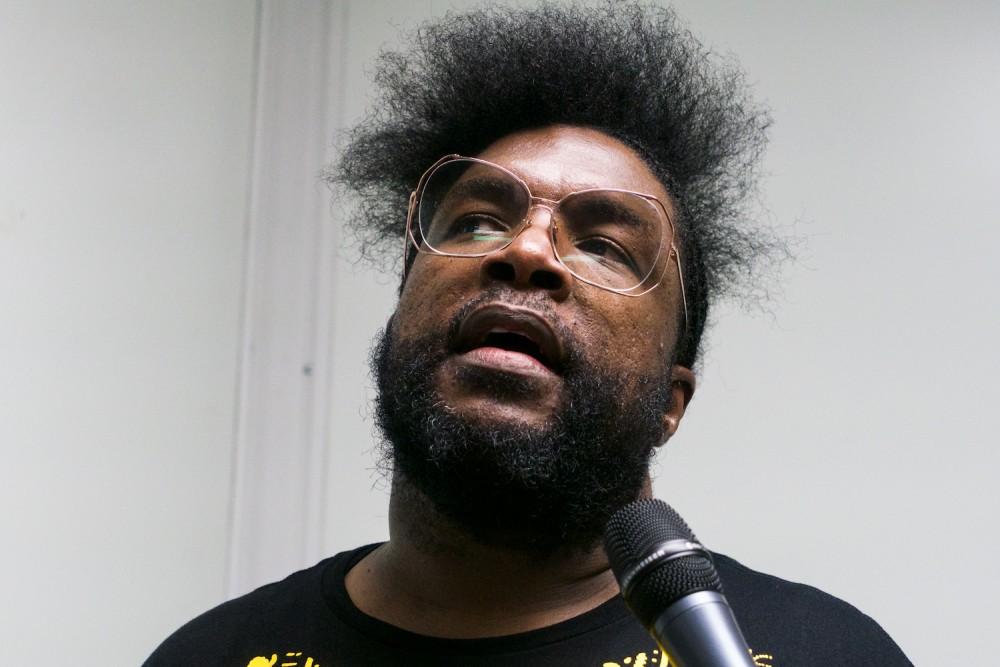Questlove Breaks Down The Daft Punk Sampling Controversy

Questlove outlines crucial flaws in the sampling system that almost ensure musicians and their catalogs get ripped off.
Earlier this week, a Los Angeles Times report detailed the account of Eddie Johns, a disco-era singer and musician who claimed he’d yet to receive any royalties from, being sampled on the 2000 Daft Punk single, “One More Time.”
The story, which dove into the hard times Johns had fallen upon in the decades since he released “More Spell On You” (the song sampled on the French duo’s breakout single,) and how his catalog was acquired by a French label larger than the one he’d released his lone album on, was almost instantly picked up by a number of music outlets (including ours.) But much like the original LA Times piece, none of the subsequent reporting on the mishandling of Johns’ check(s) was able to determine how and why Johns’ catalog, like those of countless musicians, was severed from its creator so completely that it took 20 years and a major publication’s story to bring the oversight to the attention of the label currently administering the rights to Johns’ music.
If it sounds like a lot, that’s because it is. And to get to the bottom of it, you need either a juris doctor in licensing and publishing or a cool thirty years of submitting and overseeing sample clearances. Questlove, as it happens, falls squarely in the latter category. And the Roots drummer’s take on the controversy surrounding Johns and Daft Punk’s dispute comes with an outline of the crucial flaws in the sampling system that almost ensure musicians and their catalogs get ripped off. In a lengthy Twitter thread posted on Friday, Questlove broke down how licensing and publishing administration is filled with opportunistic middlemen that hawk prospective catalog acquisitions from small regional labels. “The real culprit in the sampling controversy always lies with the invisible middlemen who acquire (sometimes legally) dormant catalogues that are up for grabs,” Questo writes.
The drummer goes on to explain how some notorious catalog collectors are actually an exception to a predatory norm. “A cat like Michael Jackson actually does right by his acquirements by purchasing songs from publishing houses and returning them to their rightful owner (Little Richard, Sly—-stop crying about the Beatles yall at the time they had a chance to purchase & scoffed & decided against),” he adds before explaining how the licensing system is effectively designed to present an artist’s publishing as a convenient cash grab in dire circumstances by mandating an artist re-register their songs with a publishing administrator within a certain amount of time in order to maintain the rights to their own music.
Questlove caps the thread with a number of propositions that would level the playing field for sample-based producers and the creators of their source material, including flat-rate sampling fees that allocate a fixed amount for both the labels (as a “tax,”) and the musicians who played on the sampled song who are not members of the American Federation of Musicians, a somewhat controversial union.
Read through Questlove’s take on the sampling controversy below.
The real culprit in the sampling controversy always lies with the invisible middlemen who acquire (sometimes legally) dormant catalogues that are up for grabs. Those who operate this way are also super litigious—-they will cop a grip of songs (all those local mom & pop labels)
— B.R.O.theR. ?uestion (@questlove) May 7, 2021
A cat like Michael Jackson actually does right by his acquirements by purchasing songs from publishing houses and returning them to their rightful owner (Little Richard, Sly—-stop crying about the Beatles yall at the time they had a chance to purchase & scoffed & decided against)
— B.R.O.theR. ?uestion (@questlove) May 7, 2021
Also the problem, the system is set up for you to use your pub as a quick cash solution. Many a hittin rapper from the 90s had hard decisions to make last year w no income. One of the things you can opt to do is sell your catalog—-like if I had a nice hit in the mid 90s
— B.R.O.theR. ?uestion (@questlove) May 7, 2021
a deal, sell your pub. Get your 2-3 mil which is a bandaid over a bullet wound. Then the owner can license to whomever. Great example is “Skinny Boys Are Back” from 86 aka the theme to Workaholics show. Thinking “we had a good run” you sell your song for say 100k…
— B.R.O.theR. ?uestion (@questlove) May 7, 2021
There is many a rabbit hole to uncover. In an ideal world there should be a universal flat rate established (now it’s crazy: Led Zeppelin is notorious for overcharging—strange considering they “sampled” from many a black blues singer w no credit) George Clinton undercharged
— B.R.O.theR. ?uestion (@questlove) May 7, 2021
this says nothing of the musicians not seeing a dime. Right now you pay the person who wrote the song & the label from which the song is being taken: so if JB covered a funky version of “The Look Of Love” you gotta negotiate w Bacharach & David (writers) & Polygram (label)
TRENDING VIDEOS— B.R.O.theR. ?uestion (@questlove) May 7, 2021
A whole generation of folk my age wondering why (said rap banger from 2020 doesn’t hit their gut the way blah blah from 1995 felt) in closing I wish this was the modus operandi:
— B.R.O.theR. ?uestion (@questlove) May 7, 2021
-flat sampling rate writer of song
-I guess a flat tax for label ?
-cut a percentage for non AFM cats (Clyde Stubblefield whose #FunkyDrummer STILL gets chopped) should have a pieces)
—this keeps those who are creative with sampling in business. This also generates interest in— B.R.O.theR. ?uestion (@questlove) May 7, 2021
aight rant over.
— B.R.O.theR. ?uestion (@questlove) May 7, 2021

